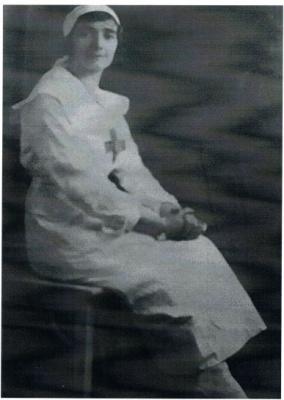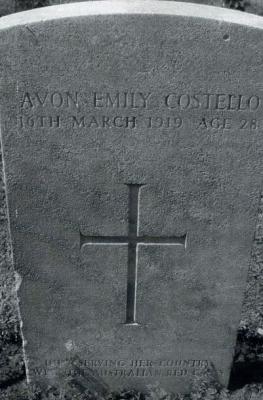By John Telfer
A young woman from Karara, Queensland, who died over 100 years ago lies at rest in a quiet section of the British war cemetery in Cairo, Egypt. What is so unique about this, is that she is the only female in this section buried among the many soldiers of the 1st Australian Imperial Force who made the supreme sacrifice at Gallipoli. She only wore a Red Cross uniform and cannot wear any campaign medals, but she died as bravely as any soldier buried there. Her name on the headstone reads: “Avon Emily Costello 16th March 1919. Aged 28. Died serving her country with the Australian Red Cross”.
Avon Emilie Allan was born on 20th September 1890 at Bombala in New South Wales, the eldest of 8 siblings from the marriage of Mary and James Allan of “Strathyre”, Karara, who had moved from Bombala to Karara to run a sheep property in the district. It is unclear where Avon received her education, possibly by a Governess which was what many children received prior to the Education Act in Queensland.
Avon was an attractive young woman who fell I love with a dashing Lieutenant from the 11th Light Horse Regiment named Edward Costello, and, with the war clouds gathering over Europe they were married on 21st April 1915, in Brisbane, before Edward was called into the First Australian Imperial Force, to embark in June 1915 for the Middle East. Avon was taken back to the Costello home at “Seagoe” where she remained for 3 years while Edward fought in the desert campaigns attaining the rank of Major and winning the Distinguished Service Order after the decisive Battle of Semakh in 1917.
For the next 3 years, Avon busied herself in the Costello household and endeared herself to one and all, as well as getting heavily involved in the war effort with fund raising and as secretary of the Thane’s Creek Australian Comforts Fund and other like organisations. Her co-workers described her as “someone who loved life, always busy, always bright. Unfailingly cheerful and optimistic and one who could exceed in extracting the sweets of living from ordinary every day life”. Although she pined for Edward as they hardly had a honeymoon before he was called to serve, her life brightened when she received a letter from Edward telling her that he had secured a passage for her to Egypt so Avon, unaware of the dangers of living in a war zone immediately made efforts to procure a passport, and eventually sailed from Brisbane to Egypt in July 1918.
Avon arrived in Cairo in August 1918 and spent many happy hours touring the many historic sight with Edward, whenever he could obtain a release from his military duties. To Avon, this was a most happy time in her young life, but with Edward away on duty, she decided to offer her services to the Red Cross Society as soon as she had settled in Heliopolis, and was attached to No 14 Australian General Hospital where she worked with the soldiers in the wards. Avon’s Red Cross record said that. “Mrs Costello was a cheerful, willing and able worker and took charge of all departments of our hospital while their responsible Heads were indisposed, or were on leave”. When off duty, Avon went on a tour of the Holy Land with Edward whenever he could obtain leave, and other outings. Life was going very well for Avon as she loved working with the soldiers and it was while Edward was in Syria fighting a war, when tragedy struck in March 1919. An outbreak of the dreaded Smallpox disease broke out in the 14th Australian General Hospital. One of the 8 patients affected included Avon, and she was moved to the Infectious Diseases Hospital at Abbassia, Egypt. Nursed by two heroic staff nurses, Elizabeth Stephens and Lillian Alton, who risked their own health volunteered to nurse their friend Avon. However, sadly, she passed away on 16th March 1919 with her loving husband Edward, who had rushed from distant military duties to be by her side. It was reported that it took Edward 3 days to reach Port Said from Syria, and a further 3 hours by train to Cairo to be at her bedside.
Avon Costello, on the very afternoon of her death was laid to rest in the small British War Cemetery in Cairo. Her funeral was attended by Edward and a small number of her friends where she was to be laid among the many courageous Australian and British soldiers buried there.
When the devastating news of Avon’s death reached her family at Karara, the grieving families of both Edward and Avon attended a Memorial service conducted by the Warwick Presbyterian minister, the Rev. W. Parton Shinton. It was held in the Warwick Presbyterian Church at Thane’s Creek attended by a large gathering of family and friends. He lamented: “We can only think with deep sorrow of the husband so tragically left alone in Egypt, of the parents of both and relatives bereaved, and of the wide circle of friends who mourn the loss of one who was the embodiment of a life that pulsated with youth, energy and the joy of living. The war has produced many tragedies. This, surely. is one of them!”
It is always a tragedy that any Australian serviceman or woman who die in the service of their country has to be interred so far away from home and family, as did Avon Costello, who died as a result of her duties as a popular Red Cross volunteer. Although she did not die in battle as many of those she is buried among did, however, she surely deserves to be recognised as one who died in the service of her country as mentioned on her headstone, and the only accolade for her devotion to her patients is in the Commemorative Roll book at the Australian War Memorial in Canberra, which recognises the names of those Australians who died during, or, as a result of wars in which Australia served.
It is hoped that this story is read by the people who have the power to allow Avon to be included on the Roll of Honour in her home town of Karara, Queensland, even though the only battle she fought was against the dreaded smallpox. She was undoubtedly a woman of extreme bravery to even enter a war zone, let alone work among the sick and injured. She did this for the love of her husband Edward, and for the benefits, comfort and support, she gave to those brave Anzacs in the hospital in Cairo. For her service to her country she should never be forgotten so it is very fitting that she lies interred among the soldiers that she gave so much help to. She is well and truly entitled to be remembered as the unsung heroine of Karara.








